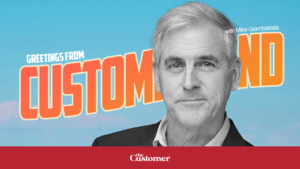An Interview With Ben Ari
This article originally appeared in Authority Magazine
TikTok is currently the fastest-growing social network. If you want to communicate with Gen-Z, that is the place to do it. But for those who are used to the interface of LinkedIn, Facebook, Twitter, or Instagram, TikTok seems to require a steep luring curve. What do you need to know to use TikTok to grow your business or engage with your customers? In this interview series, we are talking to business leaders, social media managers, marketing managers, and influencers about “5 things you need to know to leverage TikTok to grow your business.” As a part of this series, we had the pleasure of interviewing Hunter Thurman, President of market research firm, Alpha-Diver.
Thank you so much for doing this with us! Before we dive in, our readers would love to get to know you a bit better. Can you tell us the story of how you grew up?
Glad to help. I grew up in Santa Fe, New Mexico. While both of my parents were accountants, I always had an interest in human behavior and marketing. I thought I wanted to be a journalist, discovering and sharing stories, but I found my way to marketing — which is actually that same thing!
Can you tell us a story about what brought you to this specific career path?
I thought I wanted to be in advertising, and joined an agency working for Procter & Gamble. However, I quickly discovered that my passion is with the strategy side, rather than the creative side.
Can you share the most interesting story that happened to you since you started this career? The most meaningful thing that’s happened to me is meeting my teammate, T. Sigi Hale PhD. He’s a neuroscientist and when we met, he was running a neuro lab at UCLA. I had become very frustrated in my career, as I badly wanted to understand human behavior, but felt that the traditional means of market research fell short. Sigi introduced me to the established model of human behavior within neuroscience, and it was a major breakthrough in my career.
It has been said that sometimes our mistakes can be our greatest teachers. Do you have a story of a humorous mistake you made when you were first starting and the lessons that you learned from that?
Well it wasn’t so much a mistake as a defining moment. I started this company in 2011 by myself — about three weeks into leaving my previous high-paying job (and having just had my third child), I had a huge opportunity to pitch a project to a marquis client. In the meeting, one of the client team leads was really pushing me on the merits of our science-backed approach. At one point, she said “Well, what if I were to say we’d rather you take a more traditional approach?” I swallowed hard and replied with “Well, then I’d tell you I’m not the right partner.” It could’ve gone either way, but we won the project and it became a long-standing client. I guess in hindsight the “mistake” would have been to defy my principles in the interest of an opportunity I badly wanted.
Ok. Let’s now move to the main focus of our discussion. For the benefit of our readers, can you explain why you are an authority about Social Media Marketing?
We’ve developed a technique, and corresponding database, that applies neuroscience to diagnose the causation of consumer behavior. As part of this measure, we track and analyze the largest social media platforms to guide our clients’ strategic media planning and creative execution. Our insights and recommendations consistently drive double-digit business results for our world-class clients.
Which social media platform have you found to be most effective to use to increase business revenues? Can you share a story from your experience?
That’s really the unlock here — the answer to the question of “the most effective social media platform” is: “for whom?” Meaning, a team must first identify who they’re trying to influence, as a given medium can be bull’s-eye in driving behavior for one person, but a total miss for someone else. The good news is, there’s a science to identifying which platform will be most effective for a given context…
Let’s get to the main question of our interview and talk about TikTok specifically. Can you please share five ways to leverage TikTok to improve your business? If you can, please share a story or example for each. This starts with the consumer. Many marketers are focused on Gen Z, so let’s use young consumers, age 18–25, as an example. Our database reveals that this age group is having a highly emotional response to inflationary pricing. In other words, the pressure is driving them to react less in rational, price-conscious ways, and in more impulsive ways in order to gain a bit of emotional relief. We see in our data that TikTok aligns well in serving this mindset, along with Snapchat. Based on our psychological profiling, the core ways marketers can leverage TikTok to improve business are:
Let users discover something new. As they scroll the platform, the brain gets great enjoyment from discovering a new experience, such as a new TikTok dance, or a new food or beverage.
Empower the user to get social credit. Rather than focusing on an influencer or the brand, create content that lets the user shine as the star, and empower them to pass along the content to gain social ‘credit.’
Engage the senses. This sounds obvious, but driving behavior begins with grabbing attention, and in media like TikTok, motion and really high-sensory video elements will draw users to content.
Communicate close to purchase. The emotional driver behind much of younger consumers’ buying behavior creates impulse purchasing. Content served hours ahead of shopping will fail to convert, whereas content served right before consumption will create purchase decisions (a pizza ad served at 5:30PM, for example).
What would you say is the specific advantage that TikTok has over other social media platforms, like Instagram, Twitter, YouTube, or Facebook? Can you please explain with an example?
TikTok is inherently inclusive of the user, so automatically achieves many of the points above. It’s discovery-minded, giving the user social credit, in a high sensory way. This is essentially the secret of TikTok’s success, and provides lessons marketers can use across media.
There are some critics that say that fact that TikTok is owned by a Chinese company, creates a risk to people in the US. How would you answer that?
The fact that the platform continues to grow briskly confirms that users are relatively unconcerned with the app’s provenance. This is likely due in large part to the highly user-generated nature of the content; it feels like “us” versus some other culture or country behind the content, and perception is most often reality in consumers’ minds.
Because of the position that you are in, you are a person of great influence. If you could inspire a movement that would bring the most amount of good to the most amount of people, what would that be? You never know what your idea can trigger. 🙂
Well, this is not necessarily a “greater good” ambition, but I’d appeal to marketers to think beyond traditional market research to more progressive techniques. People rely on brands to solve problems and improve their lives, and only by gaining a more accurate understanding of the true pain points consumers feel can brands actually resolve tensions in real, everyday life.
We are very blessed that some of the biggest names in Business, VC funding, Sports, and Entertainment read this column. Is there a person in the world, or in the US with whom you would love to have a private breakfast or lunch, and why? He or she might just see this if we tag them 🙂
I’d like to connect with Jim Stengel. His interest in ESG topics aligns nicely with the insights we’re discovering about human behavior.
How can our readers best continue to follow your work online?
I share a great deal on LinkedIn, so readers should follow me there.
Thank you so much for these great insights. This was very enlightening, and we wish you only continued success.




